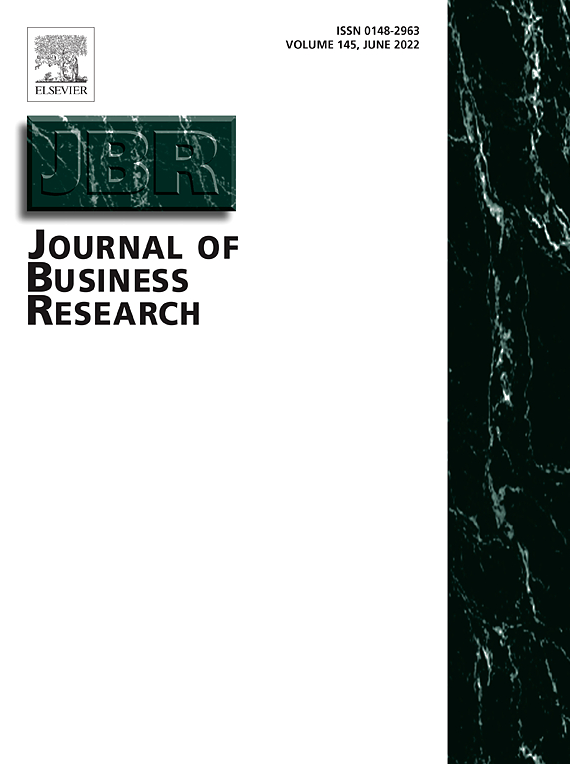Editorial Board
Marketing resources, performance, and competitive advantage: A review and future research directions
A resource-based view of stakeholder marketing
Stakeholder relationships, brand equity, firm performance: A resource-based perspective
Managing market intelligence: The comparative role of absorptive capacity and market orientation
Firms' capability portfolios throughout international expansion: A latent class approach
Managing relationships with power advantage buyers: The role of supplier initiated bonding tactics in long-term buyer–supplier collaborations
Revisiting the relationship between marketing capabilities and firm performance: The moderating role of market orientation, marketing strategy and organisational power
Effects of industry forces, market orientation, and marketing capabilities on business performance: An empirical analysis of Japanese manufacturers from 2009 to 2011
Marketing-related resources and radical innovativeness in family and non-family firms: A configurational approach
Value creation and appropriation following M&A: A data envelopment analysis
It goes with the territory: Communal leverage as a marketing resource
Strategic marketing capability: Mobilizing technological resources for new product advantage
Using blueprinting and benchmarking to identify marketing resources that help co-create customer value
Product innovation as a mediator in the impact of R&D expenditure and brand equity on marketing performance
Marketing innovation: A consequence of competitiveness
Market driving strategies: Beyond localization
Local, global, and internal knowledge sourcing: The trilemma of foreign-based R&D subsidiaries
Brand origin and country of production congruity: Evidence from the UK and China
The local brand representative in reseller networks
Localization in China: How guanxi moderates Sino–US business relationships
Identifying moderators of brand attachment for driving customer purchase intention of original vs counterfeits of luxury brands
Luxury brand strategies and customer experiences: Contributions to theory and practice
YouTube vloggers' influence on consumer luxury brand perceptions and intentions
Linking pop-up brand stores to brand experience and word of mouth: The case of luxury retail
Ingredient branding for a luxury brand: The role of brand and product fit
The effects of e-mass customization on consumer perceived value, satisfaction, and loyalty toward luxury brands
Teen attitudes toward luxury fashion brands from a social identity perspective: A cross-cultural study of French and U.S. teenagers
Factors affecting sportswear buying behavior: A comparative analysis of luxury sportswear
The effects of loyalty programs on customer satisfaction, trust, and loyalty toward high- and low-end fashion retailers
Customer emotions and their triggers in luxury retail: Understanding the effects of customer emotions before and after entering a luxury shop
Conceptualizing country-of-ingredient authenticity of luxury brands
Explaining and predicting purchase intentions following luxury-fashion brand value co-creation encounters
Social media marketing efforts of luxury brands: Influence on brand equity and consumer behavior
Identifying the configurational paths to innovation in SMEs: A fuzzy-set qualitative comparative analysis
How proximity matters in innovation networks dynamics along the cluster evolution. A study of the high technology applied to cultural goods
Relational norms in customer–company relationships: Net and configurational effects
How is value perceived by children?
Making the store a place of learning: The effects of in-store educational activities on retailer legitimacy and shopping intentions
Reviving sleeping beauty brands by rearticulating brand heritage
A meta-analysis of correlations between market share and other brand performance metrics in FMCG markets
Understanding consumer motivations to interact on brand websites in the international marketplace: Evidence from the U.S., China, and South Korea
The effect of managerial cost prioritization on sales force turnover
Start-ups, incumbents, and the effects of takeover competition
When do franchisors select entrepreneurial franchisees? An organizational identity perspective
The antecedents of cross-functional coordination and their implications for marketing adaptiveness
Assessing individuals' re-gifting motivations
The implications of slack heterogeneity for the slack-resources and corporate social performance relationship
Avoiding the “too comfortable in the saddle” syndrome: Obtaining high performance from the chairperson, CEO and inside directors
Attribute-based design perceptions and consumer-brand relationship: Role of user expertise
When good WOM hurts and bad WOM gains: The effect of untrustworthy online reviews
Early-mover advantages at cross-border business-to-business e-commerce portals
Corporate financing decisions under ambiguity: Pecking order and liquidity policy implications
The differential effects of functional vis-à-vis relational customer orientation on salesperson creativity
The boundary spanning of managers within service networks
The role of customer regulatory orientation and fit in online shopping across cultural contexts
Animated logos in mobile marketing communications: The roles of logo movement directions and trajectories
The effect of apathetic motivation on employees' intentions to use social media for businesses
Investigating partners' opportunistic behavior in joint ventures in China: The role of transaction costs and relational exchanges
The dynamic nature of social accounts: An examination of how interpretive processes impact on account effectiveness
Forecasting intraday call arrivals using the seasonal moving average method
The evoking power of servicescapes: Consumers' inferences of manipulative intent following service environment-driven evocations


